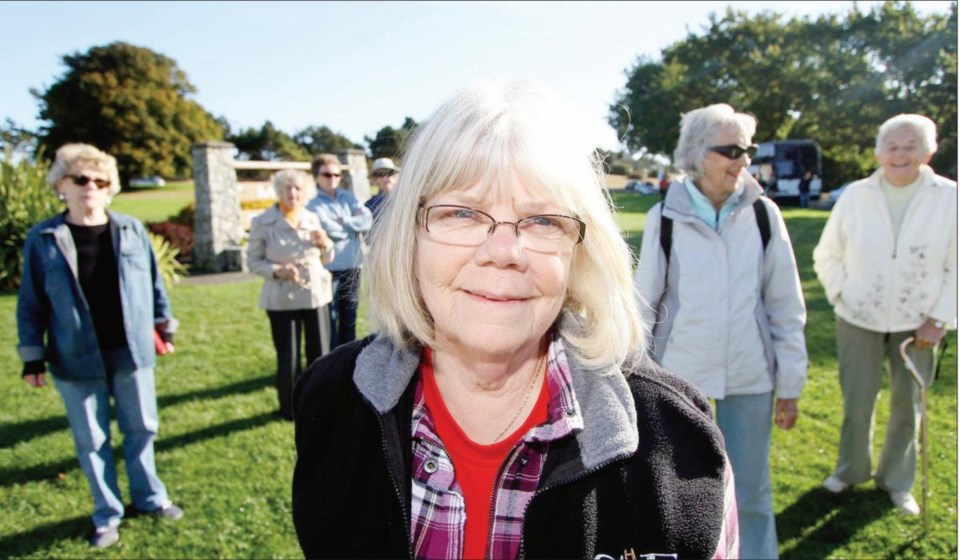When grief-stricken widow Sandra O'Leary stood at Mile Zero 10 years ago, she wasn't thinking about creating a social phenomenon.
O'Leary was still reeling from the Nov. 16, 2001, death of Arthur, her husband of 37 years. Desperate to talk to anyone who might understand, she had plastered Victoria with flyers advertising what she called A Widows' Walk, asking those who were interested to show up.
"I was a mess," said O'Leary, now 65. "So for me to get out and stand on the corner of Dallas and Douglas was huge."
Unbeknownst to O'Leary, her grown kids were watching, hunched out of sight in case nobody came. But four other women, all recently widowed, showed up that day for the first Widows' Walk. That was Oct. 13, 2002.
Now it's a regular gathering of anywhere from five to 25 women, who meet every Wednesday morning at Mile Zero and stretch their limbs in a stroll and their feelings in conversation.
Similar widows' events have started up in Sidney and one has recently began in Chilliwack.
This year, on Saturday, the widows plan on taking over as many tables as they can at the Beach House on Cordova Bay Road for a lunch to celebrate the difficulties they have overcome and the friendships they have formed.
"I'm not sure any of us could have done it without Sandra and the group back in the dark days," said Juanita Loeppky, now 71, whose husband William died on Nov. 4, 2002, after 39 years together.
O'Leary said the inspiration was really born out of necessity. After her husband died, she felt isolated and with little support.
Her four grown children were all wonderful. But they had lost their father and had their own grief to face. More, they had their own lives.
She was referred to Victoria Hospice.
But since Arthur had not been a patient there, it was not a good fit. There also seemed to be lots of forms and information required.
After dealing with death certificates, wills and other forms, O'Leary didn't have the patience.
What O'Leary said she needed was somebody to talk to urgently - somebody who would understand what she was dealing with.
Only another widow, she felt, could appreciate how difficult weekends can be without her husband. Only another widow could understand the trauma associated with clearing out a closet full of a husband's clothes.
Some, like Loeppky, do it immediately because they want to get it over with quickly. Others, like O'Leary, take years.
"[Cleaning the closets] makes it final," said walker Peggy Orr, 82, who lost her husband James on June 29, 2002, after 52 years of marriage.
Orr joined the Widow's Walk six months after her husband's death and still recalls that first Christmas.
"There were about six of us and we were standing there at the corner of Dallas Road and we were all going, 'Oh my God, it's Christmas!' And we are all weeping away," she said.
"It was so pathetic, but now looking back, we can all laugh."
Since its beginnings, A Widow's Walk has also developed small protocols. During the walk, the widows tend to pair off and talk about what they are experiencing.
If they want to cry, it's allowed. Conversation is almost never restricted.
The only hard rule the group has developed is the word "should" is strictly forbidden.
"It must never be you should do this or you should do that," O'Leary said. "It must be, 'Well, this is what I did and it helped me.' "
For example, O'Leary said a widow might complain about how quiet the house seems when she returns home.
In response, another might say she learned to leave a radio on to relieve that silence.
After the stroll, many of the women gather at a coffee shop.
By this time, many of the anxieties and troubles have been talked out. Now it's time to be with friends.
"With the whole group of us, we are all just laughing and listening and gossiping," O'Leary said. "We have a good time."
Over the years, firm, loving and happy friendships have formed.
"It is not a going-there-just-to-cry kind of thing," Loeppky said.
She recalls a time when about 20 widows were gathered at Mile Zero.
A passerby stopped and asked if the group was a political rally.
"We said, 'No, we're a widows' support group,' " Loeppky said. "He said, 'Oh no, you are all way too happy for that.' "
When Orr was in hospital for more than a month with fractured vertebrae, fellow widows visited every day.
"Even on the days I was unconscious or absolutely out of my mind, these girls came," she said.
"They were there every day and I tell you, that was big."
Now, when one is having a bad day, one of the other widows is always there to go for an unscheduled walk.
"I never say no unless I really have something firm on," Orr said. "I drop everything and say 'sure.'
"It's usually because they need to talk."
To learn more about the group, go to awidowswalk.ca. rwatts@timescolonist.com



